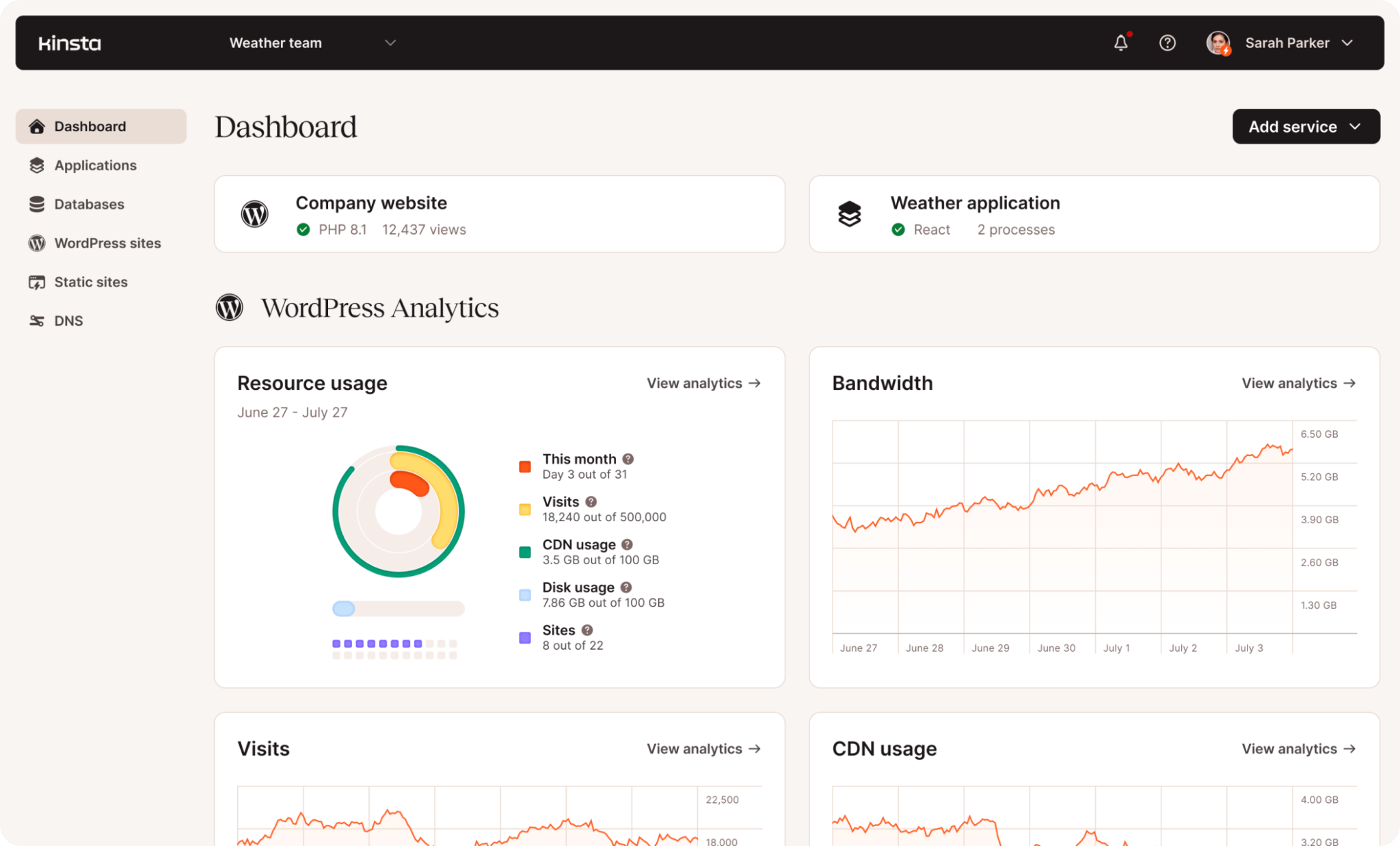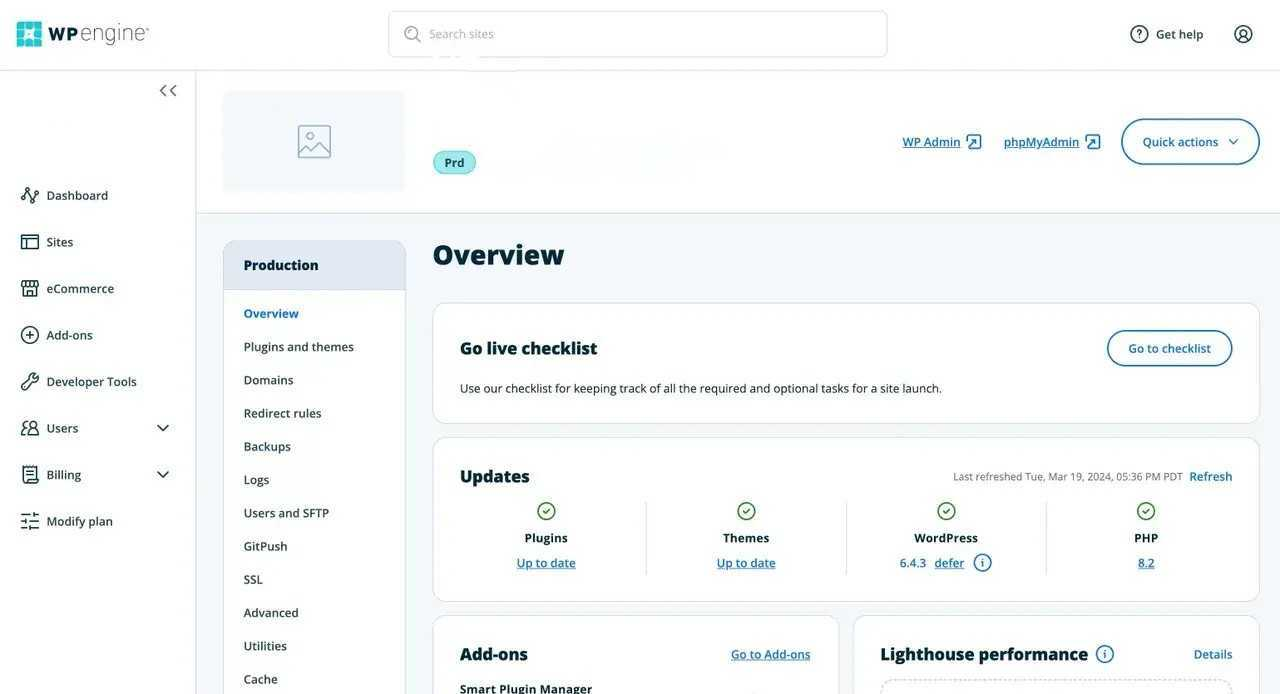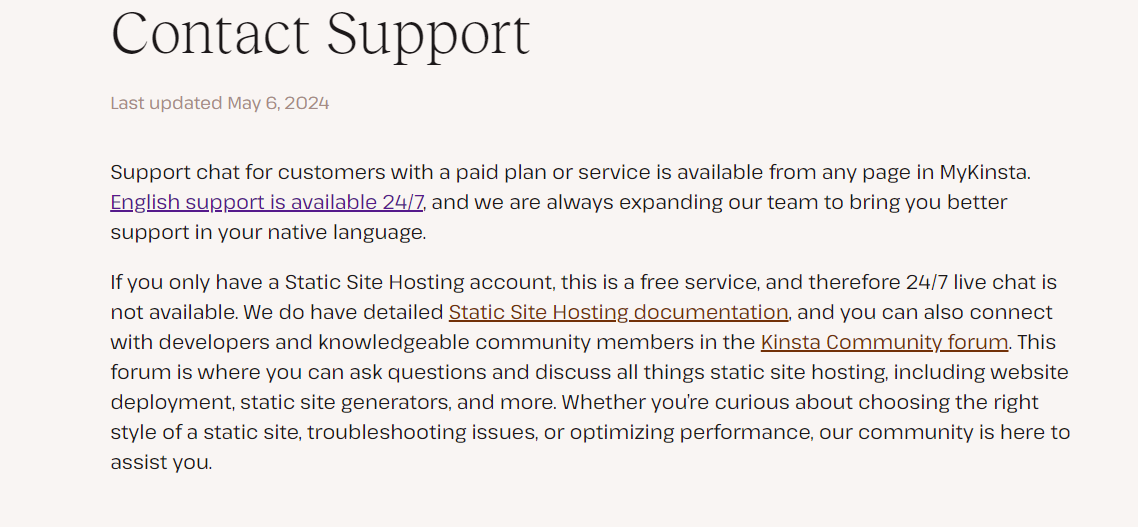WP Engine vs Kinsta: Final verdict
Looking over wpengine vs. kinsta, while both provide excellent managed WordPress hosting services, each has distinct strengths that may appeal to different user needs.
WP Engine (Overall grade: 8.6)
offers a superior managed WordPress hosting experience with features like EverCache® technology and extensive security measures, bolstered by dual compliance certifications and 24/7 support via phone and live chat. It caters well to high-traffic websites, agencies, and multimedia content with tools for smooth scalability, automated backups, and a proactive security suite. Despite its higher cost, the premium service quality, including a custom user interface and automated migration plugins, makes WP Engine a preferred choice for businesses and developers looking for reliable performance and advanced features.
Kinsta (Overall grade: 8.5)
is recognized for its exceptional uptime, consistent speed, and user-friendly MyKinsta dashboard, which simplifies site management. Built on the Google Cloud Platform with Cloudflare integration, Kinsta provides robust performance features like edge caching and MySQL optimization, along with flexible scaling options and lower entry costs. The platform shines in offering seamless website setup and easy migration processes, supported by 24/7 live chat with developer-level assistance. While its pricing may seem steep for some and lacks extensive phone support, Kinsta remains a highly reliable and efficient option, greatly appreciated by users for its high-quality, straightforward hosting solutions.
 Overall grade:8.6 |
 Overall grade:8.5 |
|
|---|---|---|
| Uptime and Availability | 9.6 | 9.7 |
| Hosting Performance | 9.1 | 9.1 |
| Hosting Security | 9.4 | 8.9 |
| Price | 8.1 | 8.8 |
| Hosting Features | 6.8 | 6.7 |
| Ease Of Setup | 8.3 | 9.3 |
| User Management | 8.8 | 7.6 |
| Customer Support | 8.9 | 8.2 |
| User feedback | 4.6/5 | 4.8/5 |
Hosting types offered
Both platforms provide a variety of hosting types, each designed to meet the different needs of users.
 |
 |
|
|---|---|---|
| Shared hosting | ||
| Cloud hosting | ||
| WordPress hosting | ||
| Ecommerce hosting | ||
| VPS hosting | ||
| Dedicated hosting |
Although both offer a variety of hosting plans tailored to different needs, in
certain cases, one platform may prove to be more suitable.
Detailed comparison
Uptime and availability
Evaluates the average uptime statistics, uptime guarantee and overall availability of the hosting
provider
Score Components:
- Uptime percentage (30%): evaluates the uptime statistics in given period of time
- Uptime guarantee (20%): Assesses if the platform offers an uptime guarantee and
whether the actual uptime matches the promised guarantee. - General performance (25%): Evaluates how fast is the average response time and overall
it’s stability. - Responsiveness (10%): Adaptability to different devices and screen sizes.
- Availability (25%): Reflects the total downtime and number of outages.
 9.6
9.6
 9.7
9.7
Section-1: Winner Kinsta
🏆 Winner: Kinsta: A highly reliable hosting service with exceptional uptime and performance.

Kinsta: A highly reliable hosting service with exceptional uptime and performance.
Section-2:
WP Engine: WP Engine offers an impressive 24/7 uptime monitoring service and achieves a remarkable 100% uptime over two months. The platform’s server response time averages at 489ms, with a tight range between maximum and minimum response times, indicating stability. Their SLA guarantees 99.99% uptime, which supports high-traffic sites without downtime.

WP Engine offers an impressive 24/7 uptime monitoring service and achieves a remarkable 100% uptime over two months. The platform’s server response time averages at 489ms, with a tight range between maximum and minimum response times, indicating stability. Their SLA guarantees 99.99% uptime, which supports high-traffic sites without downtime.
Section-3:
Kinsta: Kinsta demonstrates consistent 100% uptime in multiple tests over three years, backed by a reliable 99.9% uptime guarantee. Monitoring WordPress sites every 3 minutes, they ensure issues are promptly resolved. With an infrastructure built on Google Cloud Platform and integration with Cloudflare, Kinsta achieves an average response time of 461ms, managing high traffic without performance issues.
Kinsta demonstrates consistent 100% uptime in multiple tests over three years, backed by a reliable 99.9% uptime guarantee. Monitoring WordPress sites every 3 minutes, they ensure issues are promptly resolved. With an infrastructure built on Google Cloud Platform and integration with Cloudflare, Kinsta achieves an average response time of 461ms, managing high traffic without performance issues.
Which one has better hosting performance?
Score Components:
- Hosting speed (30%): This includes SSD quality, Load times, PageSpeed score ranges,
additional information on website speed, built-in plugins for performance enhancement, available caching
methods, and CPU/RAM options - CDN (20%): Considers whether CDN is available or not, whether it’s free or paid, and
the quality of the CDN service - Available data centers (30%): Evaluates the number of data centers and their locations
globally. - Scalibility (20%): Looks at whether elastic scaling is available, the process required
to scale (manual upgrade vs. automatic scaling), the presence of dedicated servers, and the costs
associated with scaling.
 9.1
9.1
 9.1
9.1
🏆 Winner WP Engine: exceptional managed WordPress hosting service offering superior speed and performance.
When comparing WP Engine and Kinsta, both offerings excel in different areas of hosting performance. WP Engine is renowned for its rapid page load times, supported by EverCache® technology and a global CDN with over 200 points of presence. It runs the latest PHP versions, essential for handling high numbers of requests efficiently. Kinsta, on the other hand, operates on Google Cloud Platform’s premium tier network and integrates Cloudflare for added security and performance, featuring edge caching, image compression, and code minification. Both services offer multiple data centers globally, WP Engine in key regions across the world, and Kinsta boasting 35 locations.
Website Speed
WP Engine provides fast page load times aided by EverCache® technology and optimization for Core Web Vitals, making it adept at delivering a smooth user experience. The fully-managed CDN with 200+ points of presence helps minimize latency. Kinsta’s focus on speed includes edge caching to cut Time to First Byte by up to 50% and continuous MySQL database optimization, ensuring swift data retrieval.
Scalability
WP Engine supports smooth scalability with isolated resources that ensure reliability and performance during traffic spikes. The platform includes built-in features allowing for automatic scaling without the need for manual upgrades. For dedicated servers, WP Engine’s scalable architecture ensures sites remain performant. The cost specifics for scaling aren’t detailed. Kinsta offers flexible scaling with overage protection and various plans, starting from $35 a month for WordPress hosting, making it easier for users to manage costs as they scale. The exact process for upgrading plans and dedicated server availability isn’t specified.
Which one has better security features?
and regulatory requirements
Score Components:
- Technical security measures (40%): This includes encryption, firewalls, DDoS
protection, secure configurations, server monitoring, access control and availability of security addons
(e.g Sitelock security). - Operational security measures (30%): Encompasses data privacy, backups and data
redundancy. - Compliance and certifications (20%): Adherence to legal and regulatory requirements
(e.g., GDPR, HIPAA) and possession of certifications (e.g., ISO 27001, SOC 2). - Business and reliability (10%): Factors in the provider’s reputation, uptime
guarantees, and customer support.
 9.4
9.4
 8.9
8.9
🏆 Winner WP Engine: WP Engine offers a highly comprehensive security suite for WordPress hosting.
Both WP Engine and Kinsta, have notable differences in their approaches to technical and operational
security, as well as in their compliance with regulations.
Technical security measures:
WP Engine boasts robust technical security measures, such as enterprise-grade technology capable of blocking 72 million attacks daily and keeping website vulnerabilities up to date. It also offers a managed Web Application Firewall (WAF), advanced DDoS mitigation, Cloudflare CDN, and SSL. Kinsta provides free SSL certificates, automatic HTTPS enforcement, and a managed WAF with DDoS protection via Cloudflare. WP Engine’s Global Edge Security includes features like Argo Smart Routing for real-time congestion detection and high-performance advanced security solutions, which give it an edge over Kinsta’s more standard set of technical measures.
Operational security measures:
WP Engine’s always-on monitoring blocks 26 billion+ attacks annually, with live teams managing real-time security measures and proactive security alerts. It also includes daily backups, two-factor authentication, and automatic updates for core WordPress and plugins. Kinsta offers free malware removal, multiple backup options, secure remote access via SSH or SFTP, and continuous uptime monitoring for each WordPress site. Though both offer comprehensive operational security measures, WP Engine’s proactive solutions and real-time management place it slightly ahead.
Compliance and certifications:
WP Engine is SOC-2 and ISO 27001-2013 certified, affirming its robust compliance with enterprise security standards. It also offers customized PCI compliance scanning. Kinsta, on the other hand, is SOC 2 compliant and adheres to GDPR regulations, crucial for data protection in the European Union. Both platforms adhere to high standards of compliance, but WP Engine’s additional certifications provide a slight advantage.
 |
 |
|
|---|---|---|
SSL certificate |
Free SSL certificates |
Free SSL certificates |
Additional security features |
Managed core updates, two-factor auth, daily backups |
Free malware removal, multiple backup options |
PHP versions |
Not specified |
PHP version selector |
GDPR compliance |
Not specified |
Yes |
HIPAA compliance |
Not specified |
Not specified |
PCI compliance |
Customized PCI compliance scanning |
Not specified |
Hosting features
Score Components:
- Domains (20%): Assesses the availability of a free domain, domain purchase options, and
pricing - Email (15%): Considers if the provider offers full email hosting, or is reselling
third-party service, and if the email is only transactional or not - Website builder (15%): Checks if website builder is available, and it’s user
friendliness and overall the level of customization allowed. - Staging environment (20%): Determines if a staging environment is available, allowing
for testing changes before going live. - FTP & SFTP accounts (10%): Evaluates if and how easily users can access FTP and
SFTP accounts - Git and SSH access (20%): Assess whether Git is integrated into the hosting service and
if SSH access is provided
 6.8
6.8
 6.7
6.7
🏆 Winner
WP Engine: A comprehensive hosting solution for diverse WordPress needs.
WP Engine and Kinsta both offer strong features for website hosting, but they cater to slightly different user needs. WP Engine shines with its fully managed WordPress services, providing managed updates for WP, PHP, and MySQL, alongside a unique EverCache® technology to enhance site speed. This service also includes comprehensive security measures like WAF and DDoS mitigation. With several pricing tiers accommodating startups and large enterprises, WP Engine offers flexible and robust options, including automated migration and free SSL certificates. While WP Engine does not explicitly mention a dedicated website builder, its 10 premium WordPress themes and flexible site copying tools allow for some level of customization without a dedicated website builder interface.
On the other hand, Kinsta provides a seamless experience with SFTP and SSH details easily accessible through their MyKinsta dashboard. This adjustability is beneficial for developers who demand intricate access controls. Kinsta focuses on simplicity while maintaining high performance, making it easier for users to manage their accounts and websites. Although the hosting plans and detailed features for Kinsta aren’t explicitly mentioned, the service’s integration of local development environments and meticulous attention to developer needs, such as SSH and Git access, make it an attractive option. Users looking for straightforward controls for FTP/SFTP and SSH will find Kinsta’s usability appealing.
 |
 |
|
|---|---|---|
Free domain |
No |
No |
Free SSL |
Yes |
Yes |
Email hosting |
No |
No |
Website builder |
No |
No |
Staging environment |
Yes |
Yes |
FTP & SFTP accounts |
Yes (SFTP & GIT) |
Yes (SFTP & SSH) |
Git and SSH access |
Yes |
Yes |
Free backup |
Yes |
Yes |
Money back guarantee |
Yes (60 days) |
Yes (30 days) |
a location.
As a result in rare cases the features mentioned here can differ from the ones you see on their websites.
Both providers support a range of users from beginners to experts with user-friendly website builders and WordPress staging areas. However, in terms of developer tools, both WP Engine and Kinsta offer robust options including SSH access, support for multiple programming languages, and Git for version control, thus appealing to developers looking for advanced capabilities.
Email services:
WP Engine does not provide email hosting, focusing solely on WordPress performance and security. Users needing dedicated email services would have to rely on third-party providers like Google Workspace or Outlook. Kinsta also lacks built-in email hosting but supports integration with third-party email services. Both providers fall short in email hosting capabilities but excel in other areas like site performance and development tools. For transactional emails, WP Engine and Kinsta users would need to integrate with external services.
Price
Score Components:
- Plan value (40%): What each pricing tier offers.
- Transparency and clarity (30%): Clearness of pricing structures.
- Flexibility of plans (20%): Range of options to suit different budgets.
- Hidden costs (10%): Additional expenses not included in the plan.
 8.1
8.1
 8.8
8.8
🏆 Winner Kinsta: Kinsta offers versatile plans and competitive pricing for various hosting needs.
Evaluating the pricing of plans among various hosting providers can be complex due to their differing pricing and renewal strategies. Additionally, certain plans require annual commitments, which adds to the difficulty of making comparisons. The prices listed are based on monthly commitments; plans requiring annual commitments are indicated. Additionally, although some providers offer identical plans for WordPress and shared hosting, we have created separate tables for each to enhance clarity.
WP Engine offers a range of Managed WordPress Hosting plans starting at $20/month, with notable features like automatic updates, backups, and 24/7 support. Meanwhile, Kinsta provides Managed WordPress Hosting starting at $35/month, with higher storage limits and premium migrations. Kinsta’s additional offerings include application, database, and static site hosting with various options for RAM and CPU usage, providing a broader scope for different business needs. Both providers offer premium themes and robust security features but differ in customer support and CDN offerings.
 |
 |
|---|---|
|
Startup $20/month
1 website, 10GB storage, 50GB bandwidth, chat support, SSL, SSH, automatic backups, global CDN, EverCache®, 99.99% SLA. Value for price:8.0/10
|
Starter $35/month
1 website, 10GB storage, 100GB CDN, 1 premium migration, 14-day backups, free SSL. Value for price:8.5/10
|
|
Professional $40/month
3 websites, 15GB storage, 125GB bandwidth, phone support, SSL, SSH, automatic backups, global CDN, EverCache®, 99.99% SLA. Value for price:8.1/10
|
Pro $70/month
2 websites, 20GB storage, 200GB CDN, 2 premium migrations, 14-day backups, free SSL. Value for price:8.6/10
|
|
Growth $77/month
10 websites, 20GB storage, 200GB bandwidth, priority support, SSL, SSH, automatic backups, global CDN, EverCache®, 99.99% SLA. Value for price:8.2/10
|
Business 1 $115/month
5 websites, 30GB storage, 400GB CDN, 3 premium migrations, 14-day backups, free SSL. Value for price:8.7/10
|
|
Scale $194/month
30 websites, 50GB storage, 500GB bandwidth, priority support, SSL, SSH, automatic backups, global CDN, EverCache®, 99.99% SLA. Value for price:8.3/10
|
Business 2 $225/month
10 websites, 40GB storage, 600GB CDN, 3 premium migrations, 14-day backups, free SSL. Value for price:8.7/10
|
|
Custom $600/month+
Contact sales for details, priority support, advanced features, and optional add-ons. Value for price:8.0/10
|
Enterprise $675/month+
From 60 websites and 100GB storage, 2,000GB CDN, 5 premium migrations, 30-day backups, free SSL. Value for price:8.5/10
|
 |
 |
|---|---|
|
N/A
Value for price:N/A
|
N/A
Value for price:N/A
|
 |
 |
|---|---|
|
Custom $600/month+
Advanced features, contact sales for details. Value for price:8.0/10
|
Memory Optimized 1 $35/month
0.5 CPU, 2GB RAM, optional persistent storage. Value for price:8.4/10
|
As a result in rare cases the prices displayed here can differ from the ones you see on their websites.
Enterprise plans
WP Engine and Kinsta provide high-level Enterprise plans suitable for large-scale operations. WP Engine custom plans start at $600/month with tailored features available through direct consultation. Kinsta’s Enterprise plans start from $675/month, offering higher storage and CDN limits, as well as comprehensive migration services. Both are equipped with powerful support and security features, positioning them well for enterprise-level hosting needs, but Kinsta offers a broader range of high-performance options.
WP Engine vs Kinsta: Ease of setup
platform.
Score Components:
- Site migration (25%): Assesses whether the provider offers tools for site migration,
either automated or manual, and whether these services are free or require a fee. - Admin panel usability (35%): Evaluates the type of admin panel provided, such as the
standard cPanel or a custom solution, focusing on its accessibility and user-friendliness for both
technical and non-technical users. - Setup features (20%): Examines the availability and ease of use of various setup
features, including FTP accounts, file managers, email account setup, PHPMyAdmin, and easy CDN
configuration. - Help center quality (20%): Measures the quality and accessibility of the provider’s
help center resources, including articles and tutorials.
 8.3
8.3
 9.3
9.3
🏆 Winner
Kinsta: Kinsta ensures an efficient and user-friendly website setup and migration process.
WP Engine utilizes a custom user interface that combines ease of use with a feature-rich environment tailored for WordPress sites. It includes automated migration plugins, numerous developer tools, and detailed platform settings which make it suitable for both beginners and advanced users. On the other hand, Kinsta features the MyKinsta dashboard, renowned for being intuitive and user-friendly. The dashboard simplifies site management through one-click backup creation, easy cache management, and PHP version selection, ensuring it can cater to both technical and non-technical users.

When comparing migration tools, WP Engine offers both automated and manual migration options. The automated process is facilitated by a free plugin, while a detailed manual migration checklist is available if the plugin is incompatible with your current host. WP Engine also provides 24/7 support to assist with the migration process at no additional cost. Kinsta, however, offers a direct migration request through the MyKinsta dashboard. They provide both basic and premium migrations, detailing steps and support for each, ensuring a seamless migration experience.

WP Engine offers a comprehensive support center that includes articles on various hosting and WordPress-related topics, along with step-by-step migration guides, video tutorials, and best practices. Their support team is available 24/7 via phone and chat, comprising WordPress experts who handle complex issues. Kinsta’s knowledge base is extensive, covering a wide range of topics, from account questions to development environments. They offer 24/7/365 live support through chat, staffed by experienced developers and engineers. Additionally, Kinsta provides a community forum and proactive monitoring of all hosted WordPress sites.
The platforms provide extensive knowledge bases filled with guides, how-to articles, and instructional content. WP Engine offers a wide range of resources alongside 24/7 chat and phone support. Kinsta also boasts a detailed help center with an intuitive search function and around-the-clock support via live chat, phone, and ticketing, ensuring comprehensive user support.
User management
accessibility.
Score Components:
- Role customization (40%): Flexibility in creating and defining user roles and
permissions. - Ease of management (30%): User interface and tools for managing users.
- Access control (20%): Effectiveness of access control measures for different user
levels. - Scalability (10%): Ability to manage a growing number of users efficiently.
 8.8
8.8
 7.6
7.6
🏆 Winner: WP Engine: A sophisticated platform for managing user roles and permissions effectively.
When examining the user management capabilities between WP Engine and Kinsta, WP Engine demonstrates a higher degree of flexibility in creating and defining user roles. WP Engine allows for a more granular approach to assigning permissions, with various levels of access ranging from Owners to Partial Users with billing and technical privileges. This makes WP Engine highly suitable for teams requiring distinct roles and responsibilities. Kinsta offers a more simplified structure, with roles like Company Owners, Company Administrators, and Developers, but it does not delve deeply into partial user roles or specific permissions. This can limit the customization options available to the user.
In terms of user interfaces and tools provided, WP Engine offers a detailed user portal that lets administrators manage users efficiently. The interface includes features for adding, editing, and removing users, as well as defining technical contacts. In contrast, Kinsta’s user interface is straightforward but less feature-rich, focusing more on the customer’s responsibility to manage their users and ensuring their account security through features like Two-Factor Authentication (2FA).
Assessing the effectiveness of access control measures and scalability for managing a growing number of users, WP Engine provides a comprehensive activity log that captures actions related to user management and account activity. This feature can significantly aid in monitoring and managing an expanding team. Kinsta relies more on the customer to keep their credentials safe and manage access levels, which might not scale as efficiently for larger organizations. Kinsta’s approach may suffice for smaller teams or individual site owners, but WP Engine’s more structured system is better equipped to manage larger user groups efficiently.
WP Engine user roles table:
| Role | Description | Access highlights |
|---|---|---|
| Owner | Full administrative control within the User Portal, including user management and site transfers. | Full access to all environments, ability to delete users and sites, manage billing info, and purchase add-ons. |
| Full (with Billing) | Access to Billing section and capability to purchase add-ons but cannot delete sites or users. | Can initiate site transfers, manage plugins, and access all environments. |
| Full (no Billing) | Similar to Full (with Billing) but with no billing permissions. | Can accept and manage transferred sites and modify Smart Plugin Manager settings. |
| Partial (with Billing) | Limited access to specified environments with billing capabilities. | Can make billing changes, initiate site transfers within assigned environments, and manage backups. However, they cannot delete sites or users or manage Smart Plugin Manager. |
| Partial (no Billing) | Restricted to specified environments without billing capabilities. | Can modify only designated environments, manage backups, and restore environments. Cannot perform actions related to site transfers or Smart Plugin Manager. |
Kinsta user roles table:
| Role | Description | Access highlights |
|---|---|---|
| Company Owner | Full access to the company and user management, including adding and removing users. | Complete control over user access and site management, including the ability to grant and revoke permissions. |
| Company Administrator | Can manage users and access company-wide settings. | Ability to add and remove users and manage user access across different areas. |
| Company Developer | Can view company users and grant site access but lacks full administrative capabilities. | Limited to site-specific tasks, including user access for development purposes. |
Customer support
hosting provider.
Score Components:
- Support communication channels (30%): Measures the variety of customer support types
provided (live chat, chatbot, email, phone, etc.) - Availability (20%): Assesses the availability hours for each channel, including 24/7
support options. - Technical support quality (30%): Assesses whether the provider offers comprehensive
technical support, including hardware upgrades (e.g., HDD to SSD), software installations, and web
server configuration changes. - Enterprise support (20%): Checks if there are dedicated or priority support services
for enterprise-level customers.
 8.9
8.9
 8.2
8.2
🏆 Winner WP Engine: WP Engine excels in providing comprehensive 24/7 customer support with high customer satisfaction.
 |
 |
|
|---|---|---|
Phone support |
||
Live chat support |
||
Chatbot |
||
Email/ticket support |
||
Enterprise support (dedicated agent, priority support) |

WP Engine offers 24/7 support via phone and live chat for all clients, ensuring immediate assistance. Their User Portal provides easy access to functionalities like billing and plan modifications, adding convenience. WP Engine’s customer satisfaction is high due to their focus on WordPress expertise and extensive knowledge base, making it easy for users to find self-help resources.

Kinsta also provides round-the-clock support through live chat available in multiple languages for paid plans. They offer email support for all inquiries and ensure an average response time under two minutes. Proactive site monitoring every three minutes showcases their commitment to site performance. Though offering significant customer support features, Kinsta’s more limited phone support options and shorter money-back guarantee are aspects to consider.
WP Engine vs Kinsta: User feedback
WP Engine exudes excellence in managed WordPress hosting, boasting top-notch technical support that’s often highlighted as a standout feature. Users appreciate the user-friendly dashboard, seamless migration tools, daily backups, and solid security measures, all of which contribute to high performance and reliability. However, the service does come at a higher price point, which some users find steep, especially for entry-level plans or smaller projects. Despite occasional concerns about costs and some technical nuances, WP Engine’s premium service quality justifies the expense for many, making it a highly recommended solution for businesses and developers alike.
Kinsta is highly recommended by users for its reliable and easy-to-use hosting services, particularly for WordPress sites. Customers appreciate the fast and responsive customer support, impressive speed, and robust security features provided by the platform. The user-friendly dashboard and extensive documentation also stand out as significant advantages, making it easy for both novices and tech-savvy individuals to manage their sites. However, some users find the pricing to be on the higher side, and a few have suggested improvements like expanding data center locations and providing direct access to all integrated services. Overall, Kinsta is praised for delivering a high-quality, dependable hosting experience.
WP Engine vs Kinsta: FAQ
Which platform is better suited for hosting WordPress websites?
Both WP Engine and Kinsta excel at hosting WordPress websites with specialized features aimed at enhancing performance and security. WP Engine is known for its advanced features such as EverCache® technology and enhanced multimedia handling. Kinsta stands out for its user-friendly MyKinsta dashboard and integration with the Google Cloud Platform. The choice depends on specific needs like advanced features versus user-friendly interface and developer tools.
Which hosting service offers better security features?
WP Engine offers superior security features including enterprise-grade technology capable of blocking 72 million attacks daily, managed Web Application Firewall (WAF), advanced DDoS mitigation, and SSL. Kinsta also provides robust security measures like free SSL certificates, automatic HTTPS enforcement, managed WAF with DDoS protection through Cloudflare, but WP Engine’s comprehensive security suite gives it the edge. Both platforms are well-equipped, but WP Engine’s more extensive set of features makes it a strong contender in this category.
What are the major differences in pricing and value between wpengine and kinsta?
WP Engine’s Managed WordPress Hosting plans start at $20/month with features like automatic updates and global CDN included. Kinsta’s plans start at $35/month, offering higher storage limits and premium migrations. Kinsta’s pricing includes additional options for application and database hosting, while WP Engine focuses more on WordPress-specific features. The value for price varies depending on specific needs, with Kinsta’s broader range of hosting types providing flexibility, whereas WP Engine offers a more focused service set with numerous resources.
Which platform offers better customer support?
WP Engine provides 24/7 customer support via phone and live chat, featuring WordPress experts and a comprehensive support center with articles, video tutorials, and knowledge base. Kinsta offers 24/7 support through live chat staffed by experienced developers and proactive site monitoring. However, Kinsta’s phone support is less extensive. Both platforms are praised for their quality support, but WP Engine edges ahead with more robust contact options including phone support.
How do the backup and recovery services compare between the two platforms?
WP Engine provides automatic daily backups and easy restoration from their user portal. They also maintain proactive security alerts and real-time management of backups. Kinsta offers multiple backup options, including daily automatic backups with a 14-day retention period and free malware removal. Both platforms offer reliable backup and recovery services, but WP Engine’s integrated approach and additional security alerts provide an extra layer of reassurance.
How do the providers handle email hosting and what features are included?
Neither WP Engine nor Kinsta offers built-in email hosting services, focusing solely on WordPress performance and security. Users needing email services must rely on third-party providers such as Google Workspace or Outlook. Both platforms provide robust site performance features but do not include email hosting in their plans, necessitating external solutions for email needs.
The making of this blog
We followed a clear, step-by-step process to write and research this article.








